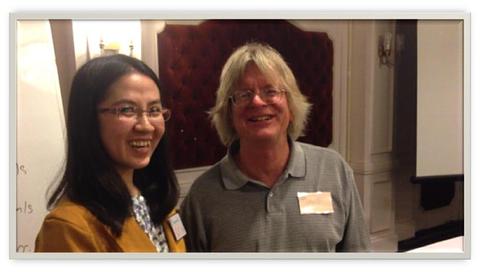การสอนวิทยาศาสตร์ด้วยภาษาอังกฤษ
มีโอกาสได้เข้ารับการอบรมการจัดการเรียนรู้วิทยาศาสตร์ด้วยภาษาอังกฤษ
จัดขึ้นโดย สสวท. เน้นกิจกรรม iquiry-based Learning มีกิจกรรมสนุกๆ
และแนวทางในการจัดการเรียนรู้ นำมาแลกเปลี่ยนในรูปแบบเล่มรายงาน
สำหรับแลกเปลี่ยนเรียนรู้กับคุณครูในโรงเรียนที่สอนวิทยาศาสตร์ด้วยภาษาอังกฤษ
รวมถึงคุณครูที่กำลังจะสอนวิทยาศาสตร์ด้วยภาษาอังกฤษค่ะ
แนวคิดคือ เริ่มทำวันนี้ 1 อาทิตย์ นักเรียนอาจได้เรียนรู้สิ่งใหม่ๆ เพียง 1 อย่าง
1 ปี นักเรียน ได้เรียนรู้สิ่งใหม่ๆ 52 อย่าง
สอนวิทยาศาสตร์ด้วยภาษาอังกฤษวันนี้ เริ่มต้นด้วยคำศัพท์ง่ายๆวันละ 1 คำ
1 ปี นักเรียนเรียนรู้ 365 คำ
4 ปี นักเรียนจะเรียนรู้กี่คำ ฝากคุณครูไปคิดต่อเป็นการบ้านค่ะ
รายงานอบรม Training for trainer.pdf

ใน ความรู้ด้านการจัดการเรียนรู้ : ประสบการณ์ที่ครูต้องสั่งสม
ความเห็น (5)
'Learning science by learning one English word per day' , I don't think this will work for children's benefits. Perhaps, one science "concept" per day in English, in Thai and in other media: video, construction, experiment, etc may do some good. ;-) For example one word 'heat' -
Heat: concepts involving heat
specific heat, heat transfer, caloric heat/calory/joule/BTU, latent heat,,...
temperature, absolute zero (0K), (Einstein's) condensates, (volume) expansion+contraction,...
high pressure/low pressure (weather) cells, convection, cyclone, twister, tornado,...
heat engine, steam, hot air engine, cooking/baking, drying, welding,...
Thank you for sharing your idea. You got point but I write that for encourage teacher who afraid to teach Science in English. Many Sciences teacher afraid to use English in their class. They alway say I teach in local class not world class. For instance I'm not good in English but I must to teach Science in English. What should I do. I would like to begin with small step but continue.
Thank you again. I hope one day Science Teacher can use your technique in their class and success.
**many science teachers
Forgive me for being a pest -- and would not let things go easy (on us).
We have 2 (i think) conflicting issues.
1) we can see benefits of learning science in 'official science language' but these benefits arise because we are competent and can use English.
2) we can see children not understanding English and thus not able to grasp science, so time is wasted, children get turned off from sciences and teachers get assessed for failures.
I admire your courage and I sincerely wish we can do that (I have had experiences learning many things in English and many things in Thai and a few more languages, I did enjoyed the learning) without harming learners and teachers. Children must not be used as guinea pigs for a sudden flash of ideas.
May I suggest, we talk about this more. But we should make it more specific like what year in primary or secondary school, what particular science topics (physics, biology, chemistry,...) we would like to teach in English, what are the aims and methods, what are the vocabulary (sets of words) for that topic/lesson,... We have more to do from visualization to programmed execution.
What say you?
Thank you so much again for suggestion me.
I love your comment because it's very useful for me to think about how to teach Science in English.
I love Science as English but I'm not well in English so I try and try.
Maybe I'm so excited about my experienced and shred it without careful thought.
Thank you for let me see the point.
I looking forward to learn and share with you.
If you have idea or anything about teaching Science in English, please let me know.
Your Sincerely
KruPumBiO